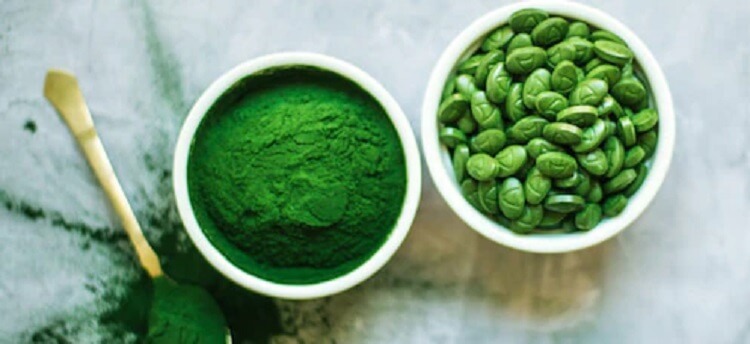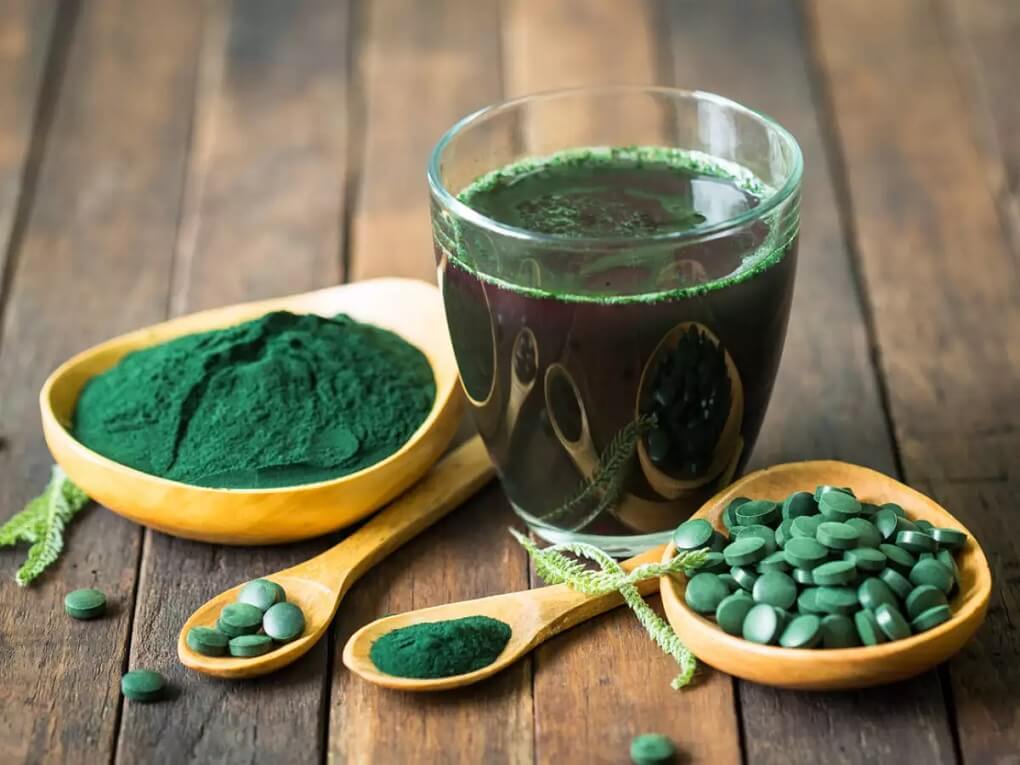If we told you that you could add a superfood to your smoothies that could have anti-aging skin properties like boosting collagen or reducing heart disease risks, would you take it daily? Consider adding the blue-green algae, spirulina, to your daily diet to reap the myriad of health and beauty benefits of this supplement. We interviewed registered dietician Kayley Myers to get the facts we needed.
What is spirulina?
According to Myers, spirulina is a popular blue-green alga due to its health claims. After being successfully used by NASA astronauts on a space mission as a dietary supplement decades ago, earthbound folk wanted to find ways to reap the alga’s benefits. It’s also a popular ingredient you’ll find in some of the best greens powders.
You’ll often see spirulina sold as a dark green powdered supplement, as a pill, or in flakes. You can find it at most health food stores and online retailers that sell health foods and supplements. This protein-rich alga is chock-full of vitamins, nutrients, antioxidants, and essential fatty acids.
“It’s typically best to mix it into foods with other flavors rather than just mixing with water,” Myers said. “Consider adding spirulina powder to your favorite homemade smoothie or energy bites.”
A standard dose is around 500 milligrams per day, according to Mount Sinai. Various health claims — like those mentioned below — have been tied to different amounts, usually starting at 1 gram daily and increasing from there.
What are the health benefits of spirulina?

Here’s what the science and experts have to say about spirulina’s potential health benefits.
It may help protect your skin
A number of spirulina extract-based cosmetic products on the market right now claim moisturizing, anti-aging, and anti-acne benefits as well as the ability to treat pigmentation disorders and heal wounds. While science might not be able to definitively back it all up, spirulina’s uses in beauty products are intriguing.
Spirulina’s most often-touted benefits are antioxidant properties that may help protect against cell damage from oxidative stress — including sun-induced damage like photoaging.
Some research indicates that this may help protect the skin and improve hyperpigmentation. Additional benefits of spirulina for skin health could be that the fatty acids help with skin hydration, and topically applied spirulina could regenerate the skin barrier while reducing water loss.
It may have anti-aging benefits
Since spirulina’s health benefits are promising, researchers continue to look for new ways to explore the various ways it can be used — and combatting anti-aging skin properties is one of them.
Scientists are exploring how spirulina crude protein could improve human fibroblast cells, which can delay the aging process of the skin and promote collagen formation. Research is still in the infancy stages, but it looks promising.
It can help allergy sufferers

According to Myers, spirulina may help relieve symptoms of people living with hay fever. “There has been some research to suggest that spirulina may help reduce the immune response to some environmental allergies.”
In fact, one study even saw that subjects who used spirulina saw an improvement in allergy symptoms, including itching, runny nose, congestion, and sneezing.
It may promote weight loss
Could adding this green to your diet help you lose weight? A recent study looked at the impact of taking a spirulina supplement could have on weight loss.
Some study subjects who took spirulina daily showed lower body mass index (BMI), waist circumference, and overall body weight. Other research mentioned in that study showed reduced appetite, body weight, BMI, and total cholesterol after taking spirulina supplements daily.
It may help your heart
The antioxidant and anti-inflammatory benefits of spirulina that reduce oxidative stress may reduce instances of cardiac hypertrophy, heart failure, and hypertension. Spirulina may help lower LDL (bad) cholesterol and triglycerides, both associated with heart disease, according to Myers.
How to shop for spirulina

No matter what type of spirulina you buy, make sure it’s from a trusted brand that’s been third-party tested, as this algae could contain toxic substances called microcystins, or heavy metals from the water it grew in. This might be a situation where choosing organic is best if you can.
Possible side effects of spirulina
Know that any time you start taking a new supplement, there’s a chance you could experience adverse side effects. Spirulina has anticoagulant properties, so it might impact the body’s blood clotting ability, which could also show up as more bruises when you bump into things.
People with autoimmune diseases should avoid taking the blue-green algae as it could cause the immune system to “ramp up” and increase symptoms of autoimmune diseases.
“It can also interact with several medications, so talk with your doctor before starting a spirulina supplement,” Myers warned.
*Always discuss changing or adding new supplements to your diet with your doctor before doing so to prevent unwanted side effects.





